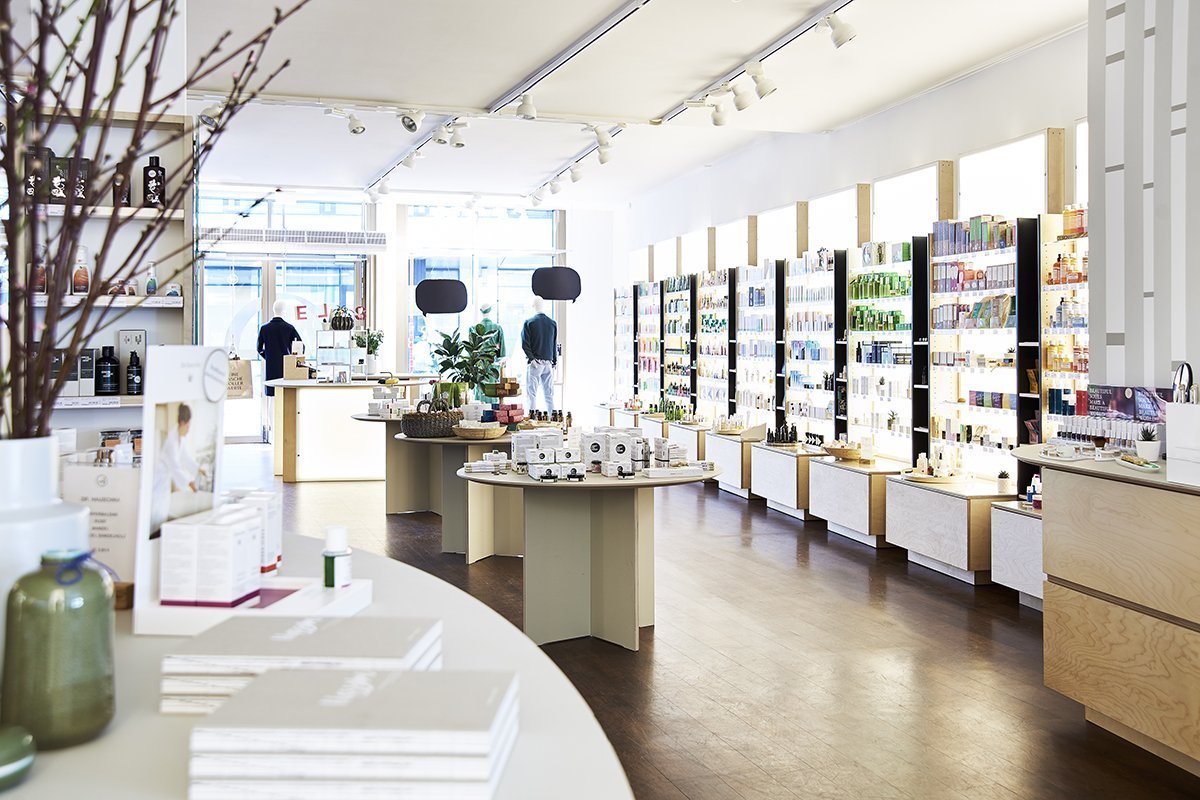
Werte Freunde Wants To Be The Follain (Plus Fashion) Of Germany
Hamburg has no shortage of beauty shopping destinations. There are 20 Douglas doors spread about the German city, including the stunning Douglas Pro Store, and the impressive beauty floor at luxury department store Alsterhaus is nearly as breathtaking as the famous manmade lake Binnenalster it overlooks. Still, discerning Hamburg beauty consumers looking for a curated selection of prestige clean beauty products had been left hanging until the arrival of Werte Freunde. Opened last October by natural cosmetic industry veteran Janine Werth, Werte Freunde is the first German concept store to bring together eco-conscious beauty and fashion brands under one roof. The approximately 3,760-square-feet store has given several high-end green beauty brands, including Lily Lolo, Kjaer Weis and de Mamiel, their Hamburg brick-and-mortar debuts, while also offering price-conscious clean beauty shoppers recognizable and attainable options from European legacy brands like Farfalla and Primavera Life. Beauty Independent visited Werth in her Hamburg shop to discuss the German retail scene, price sensitivity in the clean beauty space, and selling Tata Harper treatments alongside sustainable trench coats.
What’s your background?
I was born into the natural cosmetic industry. My mom had one of the first natural cosmetics stores in the ’90s in Northern Germany, where I’m from. I worked there when I was 13. At the time, I thought it was embarrassing because we did DIY cosmetics. She taught classes like how to make your own lip balm. At 13 and 14, I wanted Nivea lip balm. I didn’t want the stuff with no name on it. It was always in our fridge, too. I’d open up the fridge, and there’d be ingredients like shea butter.
One day, I realized that it was actually really cool to work with natural cosmetics. So, I started my career in the industry working for companies like Lavera. I opened my first store in Berlin, an organic drugstore, when I was 23. I followed my mom. It didn’t work out, but that was my first experience with my own store. I had the store for two years. Then, I worked in the industry again. I worked for Ecover for a long time as a key account manager traveling around to health stores to sell them products.
I’ve also done a lot of retail concepts with natural cosmetics in Germany. Müller’s natural shop, which was like a shop-in-shop, was my concept. Then, I didn’t want to work with them any more. It’s a big company, not really organic or ecological, but it was an opportunity to do something new. After that, I started working as a consultant for retailers, for example, helping Douglas build their natural cosmetic portfolio.
I didn’t want to do that anymore. When you work as a consultant, you have to keep in mind that it is not your concept. You’re doing it for someone else and, if they decide to do something completely different, you have to get used to it and accept it. It was hard to watch them make decisions that I thought were wrong. I was confused, and I didn’t know what to do. My boyfriend said to me, “I think you need to do your retail again,” and that’s what I’ve done. And it all worked out. I got the money. I’m not really rich, it just happened.
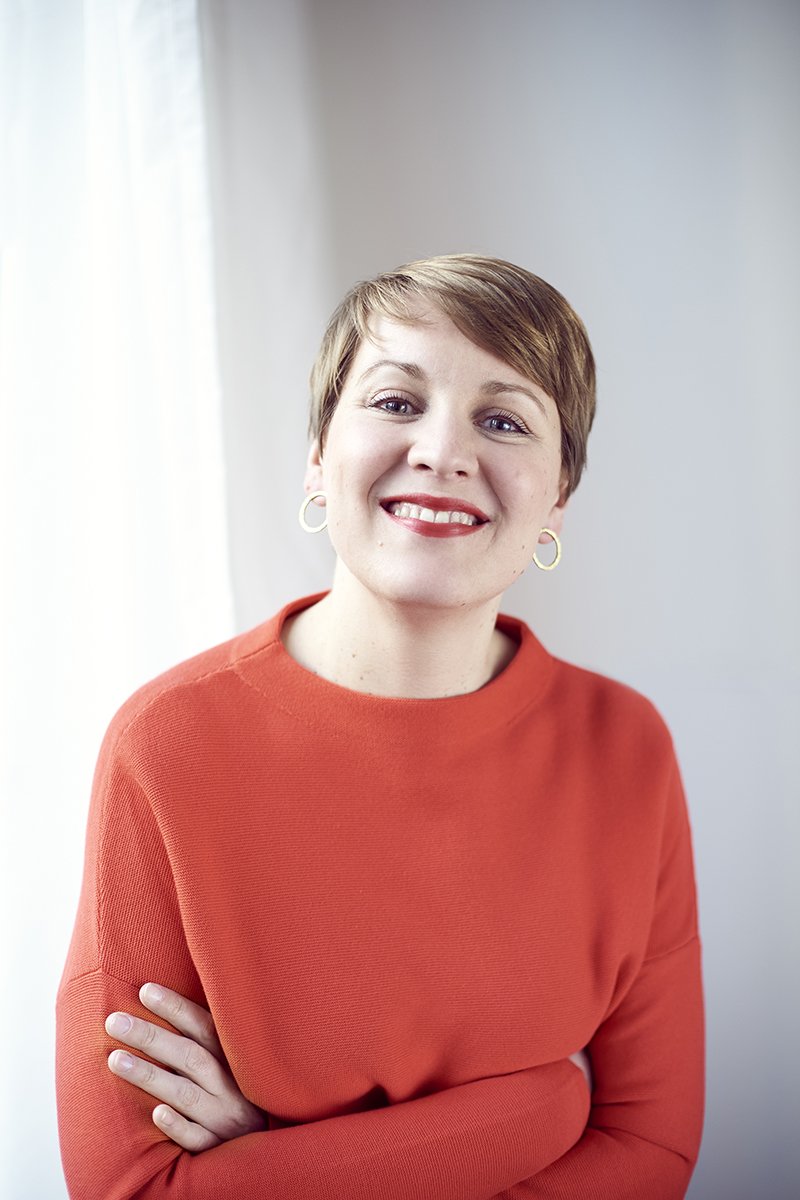
How long did it take to go from consulting to opening Werte Freunde?
Two years that were really hard. As a woman in Germany, it’s hard [to start a business]. When you look for locations to rent, they’ll ask, “Is it your husband’s or boyfriend’s money? How are you doing this?” They were shocked that I was doing this on my own. I looked at four different spaces. Two were not interesting, two were. One of those didn’t want to have me, and we are sitting in the last opportunity.
What makes Werte Freunde different?
There are a lot of concept stores in Hamburg, but this is the first concept store in Germany to mix fashion and beauty. Fashion is quite new for me, but I wanted to combine [it with] natural cosmetics. You put on natural cosmetic as your first skin. Then, your second skin should be eco-fashion. We don’t have a big natural cosmetic store here. We don’t have anything like Credo, Detox Market or Follain.
Werte Freunde means “dear friends.” You wouldn’t start a letter like that today. It’s the old-fashioned way. For me, the name is an homage to how retail used to be. You’d walk into a store and meet someone nice who really knows the products, knows what she’s doing. That’s what I like. Today, we have e-commerce and fast fashion, and sometimes you can’t even find a person. Natural beauty and eco-fashion is a people business. When you switch to natural cosmetics, you need information and guidance. I see the partners I work with—Pai, Tata Harper—as friends.
How many brands do you carry?
In total, about 80 brands and at least 50 beauty brands.
How did you select the brands?
I’ve been working with natural cosmetics for 24 years, but creating the beauty department here was the hardest thing. When you are so into something, it’s hard to decide what’s the best. It was hard [to say], “I’ll take this one, but not that one.” I wanted to take the best brands worldwide. Here in Germany, we are very into Weleda and Dr. Hauschka. The Germans know those. They love them. They buy them. That was safe.
My friend is a big natural beauty blogger in Germany. I sent her the list of brands [I was going to carry] without Weleda on it. She said, “There’s a brand missing. Where’s Weleda?” I said, “No. You can get that everywhere.” She said, “Yes, but, tell me, as a consultant, what is the role of Weleda in Germany?” I said, “It’s a very big player, and everyone knows them and likes to buy it.” That put Weleda on my list.
I also have [other European brands] Primavera and Farfalla. Then, I started thinking about international brands. I thought Tata Harper was unique, especially here in Germany, because we don’t really have German high-end natural cosmetic brands. It’s very drugstore-oriented. Primavera actually has a luxury brand, Amala. You have it in the U.S. as well. It’s good-looking, good quality, and made in the south of Germany. But they are not able to sell this brand in a lot of stores in Germany. Most of the retail sales are happening in drugstores, and Amala is too high-priced for drugstores. With perfumaries, they see natural cosmetics as a risk. They don’t see it as an opportunity. So, they just take brands that are known worldwide, and there are not so many [natural beauty] brands that are known worldwide.
I looked at what I liked from around the world. Also, the founder was really important to me. I wanted to have brands that I was familiar with the founder. I met [Sarah Brown], the founder of Pai, for example. She’s amazing, and I thought if we could bring Pai to the people of Hamburg, that would be great. Half of all the [beauty] brands we have here were not available in Hamburg before. The German natural retail market, except for Berlin, is really concentrated on cheaper German brands. But if you really want to see results, you have to pay a higher price.
Ingestible beauty is huge in the U.S. Do you carry any ingestible brands?
Yes, Ylumi. It’s like the German Moon Juice. It’s been very hard to get products like that in Germany because of regulation. You can’t tell anyone that the products do anything! It’s very difficult. [For example,] you’re not allowed to say “detox” in Germany. So, now we say “clearing” or “clean.” Lawyers see a good opportunity to earn money when they see “detox” on a product.
What are some bestsellers at your store?
Pai because it’s for sensitive skin, but it’s not just about sensitive skin, you can have sensitive combination skin, too. Some of our customers come in and already know the Pai Rosehip Oil. When I ask them where they got it, they tell me they bought it online for several years now. De Mamiel, too. If they open up the cleansing balm, they can’t believe a product can smell like that. It’s also a good product to start on natural cosmetics because you get your me time in the evening with it. It’s a ritual, which is amazing.
Oil cleansing [is interesting to our customers], too. If I show them the Whamisa Deep Rich Toner, they’re like, “What’s this?” It’s like a new world for the people here. They know all the regular retail brands, but they buy a day cream for 2.45 euros. So, a cleansing balm for 50 euros [may seem like a stretch]. But, once they smell it, they go, “OK, I understand now.”
Are your customers price-sensitive?
We meet all kinds of customers. Ones that always buy everything at the drugstore, they can be a little difficult. We’ve got i+m, that’s a vegan, fair trade organic brand from Berlin that’s lower-priced. You can get a cleanser for 14 euros. That’s my brand to start [customers] with. We don’t have something under that. I can also give them an idea of what they can buy at the drugstore if they don’t want to or can’t spend more money. I say, “Buy the Lavera Sleeping Cream.” It’s a really good cream for 10 euros.
We also have people come in and say, “I want the Tata Harper Cleansing Oil and the Kjaer Weis Cream Foundation in Silken.” When I ask how they know the store, they say from Instagram. I had my first mobile phone when I was 19. I’m 40 now, and I’m not that used to social media. So, it’s so weird for me to hear, “I know you from Instagram. Are you Janine?”
We’ve done some events with influencers, dancing events in the evening. Events are important for stores in this market. We say dance and be happy, come as you are and shake your booty. We wanted to have a lot of space for events. I want to be able to do a catwalk here, that’s my vision.
Do you usually carry a whole brand when you bring it in-store?
Most of the time, I like to take the whole brand. For Josh Rosebrook, I didn’t take the haircare. For Pai, I didn’t take the mom and baby, but I’m a big fan of taking skincare in total because when [a brand] decides to launch a product, most of the time it fits with another product in the range. I’m not a fan of taking just the Josh Rosebrook Vital Balm Cream or the Rose Cream.
When people are interested in, say, Josh Rosebrook, we try to show them the full range and tell them the benefits of using the products in combination. Many German people don’t realize how important cleansing is. They just use bar soap from the drugstore, then, they want to use the Rejuvenating Serum from Tata Harper, and I have to tell them that doesn’t really fit. Sometimes, I say, “We’ll start with cleansing, and we’ll talk about the serum later.” I tell them that cleansing is the best way to get clear, glowing skin. They don’t really know that. They are not used to oil cleansing, for example. They only know gels and foams. It’s our job to educate people.
How much did it cost to open Werte Freunde?
Half a million euros. There was nothing here for over a year [before we moved in], and it smelled stale. It was such a big room, and I thought, “I need to order so much stuff.” The good thing was it was not my first store, so I knew what to do. I don’t think it would have been possible to open a store this big with no experience.
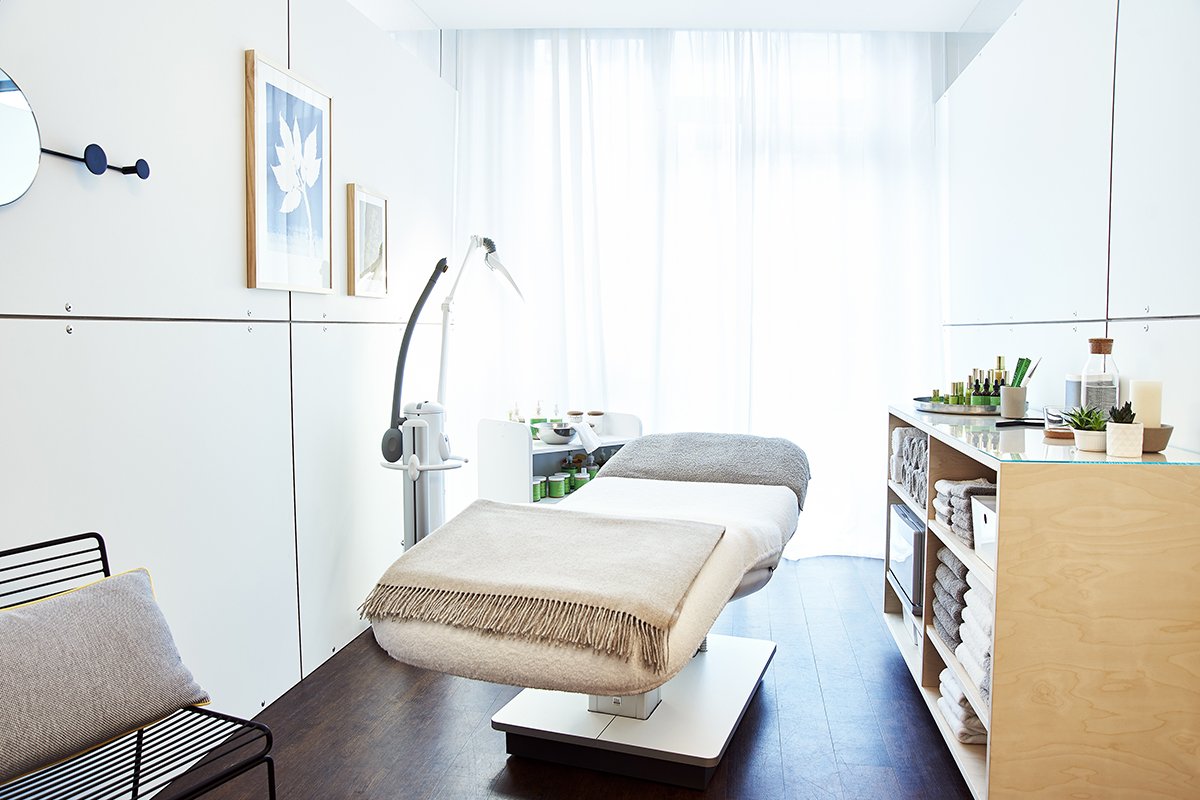
You also have treatment rooms in the store. Are treatments popular?
We have two treatment rooms. We do treatments with Dr. Hauschka in one of the treatment rooms. Dr. Hauschka is really well-known, and people want to come in for a Dr. Hauschka treatment. Then, I knew I needed something special that people don’t know here, and I saw that Tata Harper had a treatment protocol, so I brought in Tata Harper. It works.
The response has been very, very good. One treatment room door is always open as long as it’s not in use, so people can see there are treatments when they are in the store. Most of the reactions were, “That’s really smart.” I said, “Yes, it’s all about skin, eco-fashion [and] natural cosmetics.” Then, it clicks.
What are your plans for the future of Werte Freunde?
My plan is to open Werte Freunde in all the big German cities: Frankfurt, Cologne, Stuttgart. That would be a dream because we don’t really have that. We have natural cosmetic stores, but most of them opened in the 1990s, and they are still like [they were when they opened]. It’s all still the same.
We have people come in from other German cities, and they have no clue what’s going on with natural cosmetics, what’s new. They will come in, see Ilia and say, “Oh, is that new?” Other German cosmetic stores are old-fashioned, and concept stores don’t have competence in beauty. If customers [at concept stores] start asking questions, it’s a problem. One thing I don’t like about a lot of concept stores is they have a lot of stuff, but they don’t know anything about it. If I get new jeans, I need to know how they fit. Are they high-waisted? Many concept stores are more look-and-feel stores. Here, we want to show we have knowledge to share about green and clean beauty.


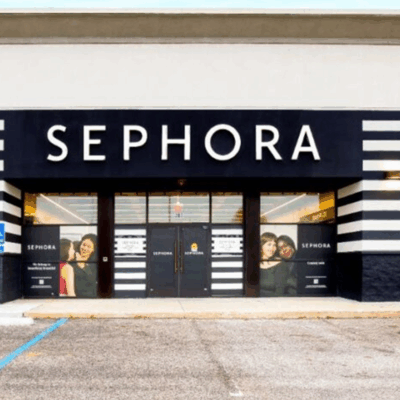

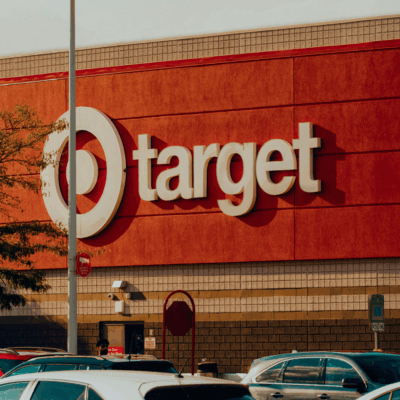
Leave a Reply
You must be logged in to post a comment.